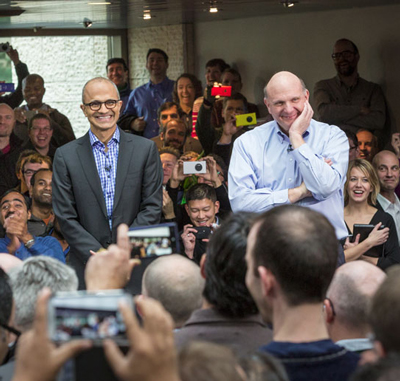Ballmer's Exit Simplifies Microsoft Board Politics for Nadella
It looks like boardroom politics just got simplified for Microsoft CEO Satya Nadella.
As we noted back in April, the Microsoft boardroom had the potential to become a very disharmonious place. For a long time, Bill Gates was revered in tech circles for exercising near total control over the Microsoft board. A key element of the most recent era of the Microsoft board was Gates and former CEO Steve Ballmer seeing eye to eye on most things, and presenting a unified front of the two largest shareholders.
With a boardroom blow-up between Ballmer and everyone else over the Nokia acquisition reportedly leading to Ballmer's sudden decision to step down as CEO, the old rules were out the window. Then with Gates stepping aside as chairman, new chairman and industry heavyweight John Thompson onboard, and activist investor Mason Morfit in the mix as Microsoft faces a very uncertain future, things had the potential to get volatile.
Another potential destabilizing element, and a big one, was the continuing presence of Ballmer on the board. Now the largest shareholder due to Gates' orderly selloff, Ballmer also had his legacy to protect, including the controversial "Devices and Services" strategy that made room for the Nokia acquisition.
 Microsoft CEO Satya Nadella (left) with former CEO Steve Ballmer at a company event announcing Nadella's appointment in February.
Microsoft CEO Satya Nadella (left) with former CEO Steve Ballmer at a company event announcing Nadella's appointment in February.
That's why some observers made a lot of Ballmer's use of the phrase "devices and services" in his board resignation letter this week.
"I have confidence in our approach of mobile-first, cloud-first, and in our primary innovation emphasis on platforms and productivity and the building of capability in devices and services as core business drivers," Ballmer wrote.
A close read of Nadella's massive strategy memo in July, though, reveals that he's very much building on and evolving Ballmer's devices and services strategy, not throwing it out. None of Ballmer's billions in investments, including in Nokia, are being written off yet in Nadella's strategy.
Even if Nadella is roughly on the same page as Ballmer for now, if circumstances change, he could have more latitude. For example, if Windows Phone's abysmal market share continues to worsen, he's going to have more room to spin off Nokia in a few years without anyone on the board feeling personally invested in it.
Microsoft's boardroom still has the components necessary for a corporate train wreck of epic proportions. But with Ballmer removing himself to the basketball court, there's one less actor on the board to cause potential headaches for Nadella.
Posted by Scott Bekker on August 21, 2014